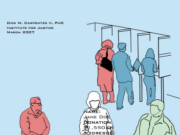A recent New York Times opinion piece by CCP Academic Advisor David Primo titled “Against Disclosure” argued that disclosure laws involve greater costs and fewer benefits than commonly recognized, leading to criticism from Lee Drutman of the pro-disclosure Sunlight Foundation. Yesterday, CCP President David Keating responded to the inaccurate and ad-hominem nature of Mr. Drutman’s attacks. However, Mr. Drutman’s criticism of a study conducted by Primo contains additional misrepresentations that warrant a response.
At issue is a survey Prof. Primo conducted of registered Florida voters in 2010. Primo split participants into three groups and provided each group with different amounts of information about a hypothetical ballot issue. Two groups did not have access to disclosure data, and one did. Participants were given the opportunity to read the materials and then asked to identify the positions of various interest groups on the ballot issue. Primo found that participants with access to disclosure data did no better than other participants at identifying which groups supported or opposed the ballot issue. Based primarily on this result, Primo states in his Times article “once you account for everything available to voters, campaign-finance disclosure provides very little informational benefit.”
Sunlight has several flawed criticisms of Primo’s design, some of which are frankly bizarre coming from a group advocating greater disclosure.
First, Mr. Drutman thinks Primo sets the bar too high, commenting that “it’s a lot to ask people to remember the positions of various groups on a hypothetical ballot measure, especially if they are only exposed to one or two news articles.” However, if it’s true that voters can’t remember the positions of groups, extensive disclosure requirements will not provide them significant benefit.
Mr. Drutman’s complaint that participants are “only exposed to one or two news articles” also falls flat. If the extent of exposure to disclosure information is Mr. Drutman’s concern, he should note that Primo’s design made disclosure data more prominent in the survey than it is in coverage of real life campaigns. For the group of participants with access to disclosure data, one sixth of the materials provided were related to disclosure. As the survey notes, disclosure information makes up a much smaller portion of news coverage surrounding actual campaigns. This biases Primo’s survey to overstate the value of disclosure, not understate it.
Mr. Drutman contends that asking survey participants to identify the positions of various interest groups is a bad measure of disclosure’s value because voters likely only need to know “the position of one really important interest group” to benefit. Considering that less than 4.3% of total federal election spending in 2012 came from groups that do not disclose all of their donors, this seems to be an argument for rolling back existing disclosure requirements. Voters already have access to much, much more than the positions of “really important” groups. If voters only need to know the position of really important groups, then mandating disclosure requirements for small ones is unnecessary and harmful.
It may seem hypocritical for an advocate of greater disclosure to argue that citizens only need to know about important groups, but in this case it’s just elitist. Mr. Drutman explains that Primo’s “research design ignores that campaign finance disclosure enables a community of watchdogs and journalists to investigate the politics around a ballot initiative… Disclosure empowers the kind of investigative reporting that can truly inform citizens about their choices.” According to him, voters don’t need disclosure data because reporters and activists will use it for them, producing a kind of trickle-down benefit to the public.
However, he provides no evidence to support this logically flawed hypothesis. Primo’s study, and other research, finds that voters are generally not influenced or informed by disclosure information. It stands to reason that reporting on disclosure would be less widely read and less influential than reporting on other aspects of a campaign.
Further, while it may be true that disclosure is primarily useful for journalists and activists, that’s not how it’s advertised to the public. Disclosure provisions are promoted as a necessary part of “the public’s right to know,” not “the activist’s right to harass.” As Primo’s Times article explains in discussing the backlash over Target’s political spending in 2010, empowering political activists with the means to harass and harm political donors is a concern about disclosure, not a benefit. The Sunlight Foundation does disclosure no favors by characterizing it as a tool of the political and media elite, but at least it’s a refreshingly honest admission.
Mr. Drutman also complains that because participants were not required to read the disclosure data they were provided with, many likely did not in order to finish the survey faster “if these survey respondents were typical.” This seems like a complaint against surveys in general, not Primo’s in particular. All surveys are useless if we assume their participants behaved unnaturally.
More importantly, voters in the real world are not required to read disclosure data either, nor is it provided directly to them. There’s no reason to assume that voters are more motivated to access disclosure data than are people who volunteered their time for a survey. By providing the information directly to participants, the survey is actually designed to overstate how many voters would choose to seek it out on their own. Mr. Drutman’s absurd suggestion to reward participants for correctly identifying the interest groups’ positions would further exacerbate this bias. In the real world, there is no financial gain for citizens in memorizing disclosure data.
Primo’s survey, published in the peer-reviewed Election Law Journal, holds up to scrutiny as significant evidence that disclosure does not increase voter knowledge as advertised. Mr. Drutman’s flawed critique of the survey just portrays his organization as not wanting to see the light.














